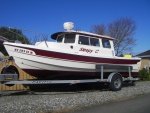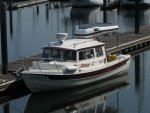Marco Flamingo
Active member
While looking at information on trailer brakes, I came across a lot of discussions where people experienced a tire blowout on a trailer. A recent post here ("Florida Trip") just mentioned two blowouts in a single trip, maybe even a single day.
I read that one should use tires labeled ST (for Special Trailer) as they have stiffer sidewalls and can carry more load, but then I see all the threads about blowouts. I've never had an actual blowout with regular street tires. I had some tread come loose back when all I could afford was re-treadded tires (which we referred to as "May Pops" even though I never had one pop".
I'm now looking at the possibility of larger wheels as part of my adding trailer brakes and maybe getting rid of my 175/70R13 wheels. It turns out that I could fit a 175/70R14 or 15" wheel and tire. These were used on many sports cars in the 1060-70s and are still fairly common. It's basically the same tire as was original on my 1973 Volvo. The modern version of that tire has a weight rating of over 1,100 pounds, which is plenty for my boat and trailer.
Is there really a reason to stay with a 13" trailer tire over a 15" passenger tire?
Mark
I read that one should use tires labeled ST (for Special Trailer) as they have stiffer sidewalls and can carry more load, but then I see all the threads about blowouts. I've never had an actual blowout with regular street tires. I had some tread come loose back when all I could afford was re-treadded tires (which we referred to as "May Pops" even though I never had one pop".
I'm now looking at the possibility of larger wheels as part of my adding trailer brakes and maybe getting rid of my 175/70R13 wheels. It turns out that I could fit a 175/70R14 or 15" wheel and tire. These were used on many sports cars in the 1060-70s and are still fairly common. It's basically the same tire as was original on my 1973 Volvo. The modern version of that tire has a weight rating of over 1,100 pounds, which is plenty for my boat and trailer.
Is there really a reason to stay with a 13" trailer tire over a 15" passenger tire?
Mark



